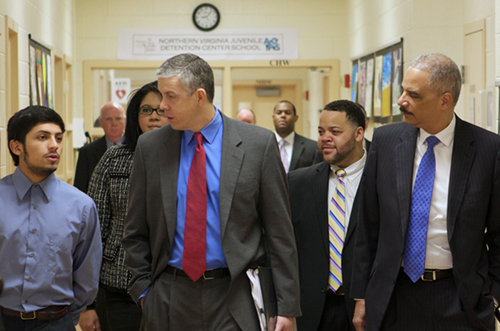Federal Agencies Release Landmark Guidance on Education in Juvenile Justice Facilities
Juvenile Law Center applauds the U.S. Departments of Education and Justice for taking a giant step toward protecting the educational opportunities and rights of youth in juvenile justice facilities. On December 8, 2014, Attorney General Eric Holder and Secretary of Education Arne Duncan released a joint policy guidance package to inform state and local education and juvenile justice agencies of best practices to improve the quality of education in juvenile justice facilities and remind these agencies of their legal obligations to do so.

Too many youth in juvenile justice facilities are falling behind in their education. A lack of standards or failure to enforce standards means youth are set up to fail. This joint policy guidance package is a major step toward improving outcomes. Better educational outcomes will reduce recidivism (re-offending), make our communities safer, and help build a stronger workforce.
Image credit: Photo by US Dept. of Education, licensed under CC by 2.0. Attorney General Eric Holden, right, with Education Secretary Arne Duncan, center, at the North Virginia Juvenile Detention Center in Alexandria, where they announced the guidelines.
The guidance builds on momentum around this issue that was catalyzed by a Summit on Correction Education hosted by the U.S. Department of Education and the Ford Foundation in April, 2013. In preparation for that Summit, the John D. and Catherine T. MacArthur Foundation funded Juvenile Law Center, along with with Open Society Foundations, Pennsylvania Academic and Career/Technical Training Alliance, Racial Justice Initiative, and the Robert F. Kennedy Juvenile Justice Collaborative, to convene eight regional meetings across the country to discuss ways to improve education for youth in and returning from correctional facilities. Through this process, we and our partners consulted over 100 community leaders and experts and prepared a set of critical recommendations to present to the federal agencies at the 2013 Summit. We are thrilled that this new federal guidance package echoes many of our recommendations, including the need to:
- align facilities’ academic curricula with state standards
- comply with federal special education law
- provide a variety of career and technical options
- train educators on the unique needs of students in juvenile justice facilities
- provide access to postsecondary programming
- collect data to monitor performance, and
- facilitate successful reentry
Currently, youth in juvenile justice facilities are chronically behind in school, and over half eventually drop out. This guidance represents important progress toward remedying these dire outcomes that often lead to deeper justice system involvement. A quality education and marketable skills are critical to a successful transition to adulthood. As Bruce Morgan, a youth in Juvenile Law Center's youth engagement program, explains,“You might be in a juvenile facility… [because] you may have or may not have made a bad decision, but you are still a youth and deserve to be challenged and pursue higher education more advanced than your present knowledge.”
Juvenile Law Center continues to work with our partners to ensure youth in juvenile justice facilities receive the education to which they are entitled. With support from Open Society Foundations, we recently launched a national listserv to connect stakeholders working on issues surrounding education and the juvenile justice system. One of our youth engagement programs, Juveniles for Justice, will focus on this topic during their advocacy work in 2015. We look forward to utilizing the new federal guidance to educate stakeholders and advance enforcement efforts across the country so that all youth receive the same opportunities for success.